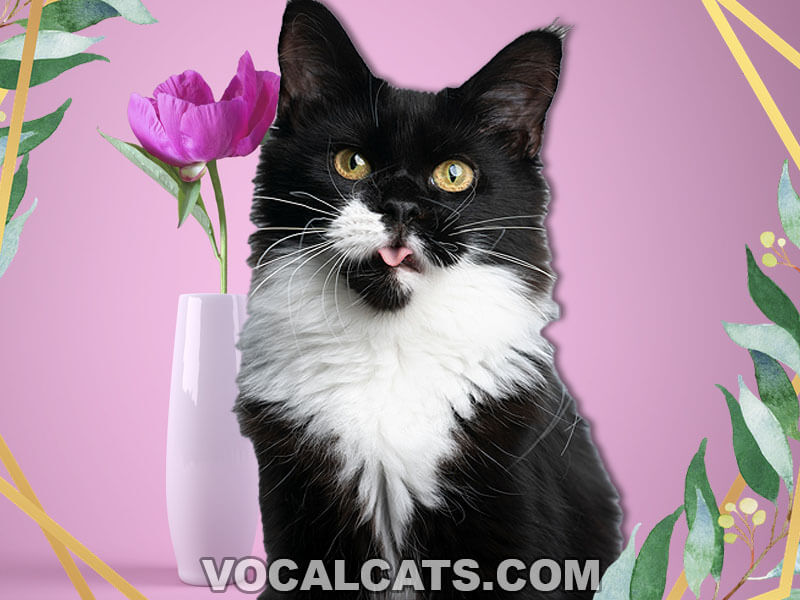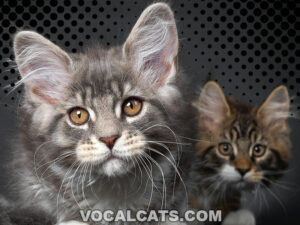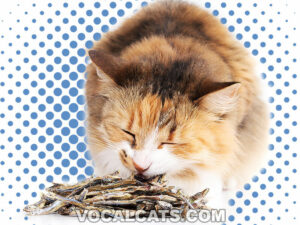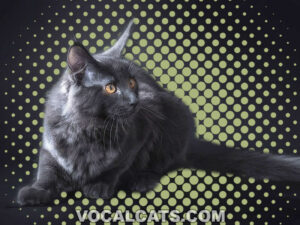Cat lovers worldwide are fans of the Tuxedo Maine Coon. Why? That’s simple. Tuxedo Maine cats are gentle, fluffy, and stylish to boot. Their black and white coloring makes them unique among cat breeds.
If you’re a Tuxedo Maine Coon enthusiast looking to glean in-depth information, you’re in the right place. This article will focus on details like history, personality, costs, etc.
Be it a Silver Maine Coon or black, there’s plenty about this species that makes it unique. So, let’s get on with our Maine Coon-centric guide without wasting more time!
Contents
- Tuxedo Maine Coon: Breed overview
- Can a Maine Coon cat be a Tuxedo?
- What is a Tuxedo Maine Coon?
- Are Maine Coon Tuxedo cats rare?
- Maine Coon cat Tuxedo history
- Maine Coon Tuxedo cat physical appearance
- Maine Coon long haired Tuxedo cat
- Tuxedo Maine Coon short hair
- Various Maine Coon Tuxedo colors and patterns
- Tuxedo Maine Coon cat size, height, and weight
- Full grown Tuxedo Maine Coon
- Tuxedo Maine Coon personality
- Are Tuxedo Maine Coon cats good family cats?
- Are Tuxedo Maine Coons outdoor or indoor cats?
- Do Maine Coon Tuxedo cats love water?
- Tuxedo Main Coon training
- Tuxedo cat Maine Coon exercise requirement
- Main Coon Tuxedo grooming and cleaning
- Maine Coon Tuxedo cat food and diet
- Maine Coon Tuxedo health issues
- Tuxedo Maine Coon cat lifespan
- Tuxedo Maine Coon breeder
- How much do Tuxedo cats cost?
- Tuxedo Maine Coon price
- Tuxedo Maine Coon kitten
- Places to find Tuxedo Maine Coon kittens for sale
- Finding a healthy Tuxedo Maine Coon for sale
- Maine Coon Tuxedo mix
- Maine Coon cat Tuxedo: Pros and Cons
- Is the Tuxedo Maine Coon right for me?
- Related Questions
Tuxedo Maine Coon: Breed overview
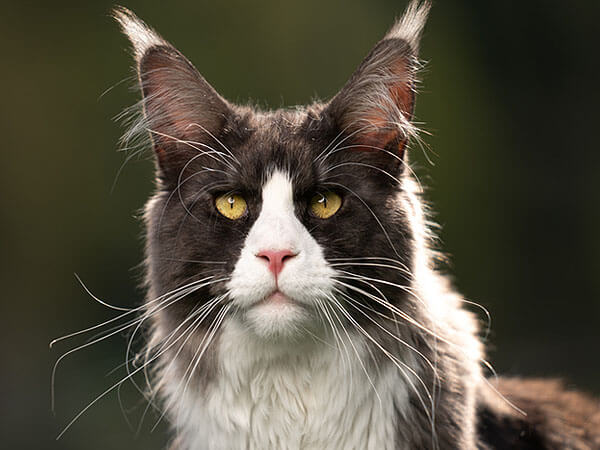
We all live busy lives. If you’re short on time but don’t want to give up on obtaining vetted info on Tuxedo Coon cats, this section can help.
Scroll below to discover a table with essential facts about the Tuxedo Maine Coon variation designed to help our on-the-move readers.
| Common Names | Tuxedo Maine Coon, Tuxedo Maine Cat |
| Size | Large |
| Weight | 10-20 pounds |
| Height | 8-16 inches |
| Lifespan | 13-20 years |
| Colors | Black and white, red and white, blue and white, cream and white |
| Child Friendliness | High |
| Feline Friendliness | High |
| Training Difficulty | Low–to-medium |
| Grooming Upkeep | High |
| Breed Health | Good |
| Exercise Needs | Moderate |
| Kitten Costs | $800-$3,000 |
READ NEXT: Cream Maine Coon (Complete Guide)
Can a Maine Coon cat be a Tuxedo?
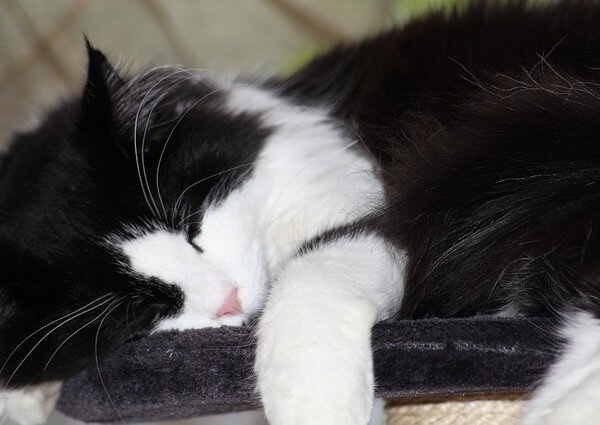
Yes, a Maine Coon can be a Tuxedo. The term ‘tuxedo’ is used for cats that display black and white coloring. These felines generally have a black base color with white spotting on the face, chest, and paw areas.
This type of bi-color pattern is found in several breeds. These include Turkish Angoras, British Shorthairs, Maine Coons, and American Shorthairs. Some mixed breeds can also qualify as Tuxedo cats.
What is a Tuxedo Maine Coon?
A Tuxedo Maine Coon is a Maine cat with a bi-color or piebald coat. A true Tuxedo Coon cat typically has a black base color and white spotting or markings around its face, chest, and paws.
Contrary to popular misconception, a Tuxedo Maine Coon is not a ‘variation,’ though mixed breed Maine Coons can sport piebald coats.
Additionally, there are three varieties of Tuxedo Maine Coons, besides the black and white color combination. These include:
- Blue Tuxedo Maine Coons.
- Cream Tuxedo Maine Coons.
- Red Tuxedo Maine Coons.
These felines have varying base colors along with white markings.
READ ALSO: Calico Maine Coon (Complete Guide)
Are Maine Coon Tuxedo cats rare?
If you’re wondering whether Maine Coon Tuxedo cats are rare, the answer is not a simple yes or no. While the bi-color class isn’t the rarest in the breed, the availability of these cats can vary depending on your location.
For example, Maine Coon Tuxedo cats may be more prevalent in some areas than others. If you live in a location with a high population of Maine Coon cats, you may be more likely to encounter a Tuxedo variety.
On the other hand, if you live in an area where Maine Coon cats are less common, you might find it more challenging to find a Tuxedo. The piebald coloration isn’t the most coveted in the Maine Coon breed. Some of the rarest colors among these felines are Chinchilla, Gold, Smoke, and Silver.
DON’T MISS: White Maine Coon Cat (Complete Guide)
Maine Coon cat Tuxedo history
There isn’t too much consensus on the origins of piebald Maine Coons. One thing is certain, though, the Maine Coon cat breed originated in New England, specifically in the state of Maine in the United States. There are quite a few origin tales for Tuxedo Maine Coons.
For instance, some stories claim the Maine Coon breed came about the black and white coloring after cross-breeding between Maine Coons and Raccoons. However, this theory doesn’t hold much weight because such cross-species procreation is scientifically impossible.
Other theories claim the Tuxedo variation originated from the earliest Maine Coon cats brought to America by European settlers or Vikings in the 1600 -1700s. This story is the one experts generally tolerate because DNA tests have revealed Maine Coons are descended from the Norwegian Forest Cat.
You may be interested in: Blue Maine Coon (Complete Guide)
Maine Coon Tuxedo cat physical appearance
Maine Coons are beloved by cat lovers worldwide for many reasons, including their physical appearance.
The breed is renowned for its large size, hefty build, and long, bushy tail. It has a broad chest, an almost rectangular body shape, and a strong bone structure. Maine Coons have muscular legs, allowing them to jump seven feet high.
The Maine Coon Tuxedo cat’s head is large and square-shaped, with defined cheekbones and large, expressive eyes that are usually green, gold, or copper in color.
Its ears are large and tufted, giving it a distinctive look. The fur on its ears is also longer and thicker than the fur on its body, giving them a lynx-like appearance.
The Maine Coon Tuxedo cat’s fur is thick, soft, and water-resistant, making it well-suited for cold climates. Its black and white fur is usually in a distinct pattern, with black covering most of the body and white on the chest, belly, and paws. The fur on its chest is often ruffled, making it look like they have a fur cape, almost like royalty.
You may also like: Black Maine Coon (Complete Guide)
Maine Coon long haired Tuxedo cat
Long-haired Tuxedo Maine Coons generally have a double coat, with the top coat containing long-to-medium-length hair. The fur around the cat’s head and neck is shorter compared to the hair around the belly and flanks. The texture of a Maine Coon’s coat is silky and soft.
Tuxedo Maine Coon short hair
Tuxedo Maine Coon Short Hairs, unlike their long-haired counterparts, have a shorter top coat. A short-haired Maine Coon will generally be a hybrid because purebred Maine cats only sport long or medium-length coats.
Various Maine Coon Tuxedo colors and patterns
Seeing as how Tuxedo or bi-color Maine Coon Cats are renowned for their coloring, there’s not a lot of variation in terms of shades and patterns. However, Tuxedo Maine Coons can differ where base color is concerned. Here’s how.
Tuxedo black and white Maine Coon cat
The Black tuxedo Maine Coon holds true to its name and sports a black base color with white markings around its paws, chest, and face. These marks make it look like the cat is wearing a jacket, hence the name ‘tuxedo’ cat.
Readers should note that a black and white Maine Coon Tuxedo can also differ in the amount of white spotting it has. For instance, 60-80 percent of a bi-color cat’s body may be white if it inherits two dominant white spotting alleles.
Grey Tuxedo Maine Coon
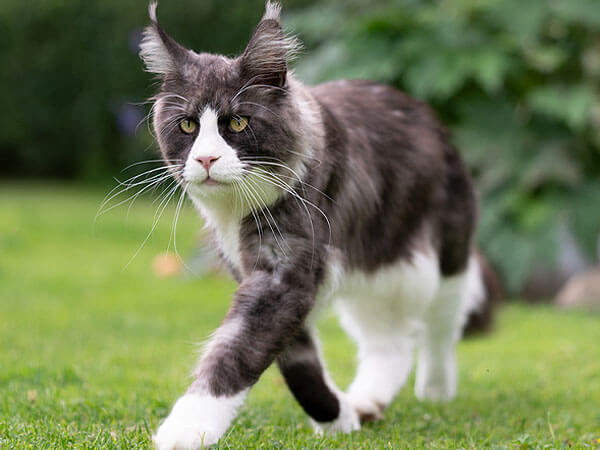
The Grey Tuxedo Maine Coon is sometimes also referred to as the Blue Tuxedo Maine Coon. Due to the dilution gene, these cats have grey (or diluted black) as a base color. However, since the dilution gene is recessive, a feline must inherit it from both its parents to be able to develop a grey or blue base color.
RECOMMENDED: Grey Maine Coon (Complete Guide)
Tuxedo Maine Coon cat size, height, and weight
Most cat lovers are curious about a breed’s size to ensure their pet can happily adjust to its new home. If you’re similarly concerned, you might want to pay attention here.
Since Tuxedo Maine Coons are generally purebloods, their size isn’t too different from the rest of the breed. Remember, Maine Coons are the largest of the domestic cat breeds. Here is how the Tuxedo Maine Coon size might differ based on sex.
| Height | Weight | Length | |
| Male | 11-16 inches | 13-20 pounds | 16-30 inches |
| Female | 8-14 inches | 10-16 pounds | 14-25 inches |
Full grown Tuxedo Maine Coon
When a Tuxedo Maine Coon reaches its full-grown size, it can weigh anywhere between 10 to 20 pounds and can measure up to 30 inches in length. These cats have a muscular build and long, fuzzy hair that requires regular grooming. In short, Tuxedo Maine Coons can grow up to their reputation as gentle giants.
Tuxedo Maine Coon personality
Tuxedo Maine Coons are known for their lively and affectionate nature, making them a suitable choice as feline pets. They’re also intelligent and curious cats with a healthy love of exploration. Maine cats are also highly adaptable and quickly adjust to new environments.
Another reason why Maine Coons are preferred pets is their love and loyalty to their owners. They love nothing more than being close to their human family members. They are also very social and enjoy the company of other cats and animals.
Despite their playfulness, Tuxedo Maine Coons are known for their peaceful nature. They are not easily frightened and are often content to lounge around in their preferred sleeping spot.
CHECK OUT: Black Smoke Maine Coon (Complete Guide)
Are Tuxedo Maine Coon cats good family cats?
Tuxedo Maine Coon cats are known for their friendly personalities, making them great family pets. These cats are gentle giants that love to play and interact with their owners. Maine Coons are also known for their patience and tolerance, making them ideal pets for families with young children.
These felines are intelligent and curious and need plenty of mental and physical stimulation. They love to play and explore, making them great companions for families who enjoy spending time with their pets.
The affectionate nature of Tuxedo Maine Coons means they like cuddling and will often follow their owners around the house. In short, these cats are peaceful, loving, and pliable, making them suitable pets for most households.
Are Tuxedo Maine Coons outdoor or indoor cats?
Tuxedo Maine Coons can thrive as both indoor and outdoor cats due to their hardiness and muscular build.
However, experts recommend keeping them indoors for their safety as they are prone to several health risks when roaming outside.
As indoor cats, they can enjoy a safe environment that covers all their needs, including food, water, litter, and toys. Nevertheless, providing them with enough room to play and exercise and enriching activities to keep them mentally stimulated is essential.
RECOMMENDED: Brown Maine Coon (Complete Guide)
Do Maine Coon Tuxedo cats love water?
Maine Coon Tuxedo cats are renowned for their fondness for water. These cats have thick, water-resistant coats that help them stay warm and dry while playing in the water. They enjoy dipping their paws in water bowls and tolerate bath time better than other cat breeds.
However, not all Maine Coons are created equal. While some of the breed like frolicking in the water, others may not like getting wet. It depends on your cat and its individual preferences.
DON’T MISS: To learn more, check out Do Maine Coons Like Water?
Tuxedo Main Coon training
Tuxedo Main Coons are pretty easy to train, thanks to their intellect and calm nature. Cat parents need to think about training and socializing their Maine Coon kittens as soon as they come home.
The good news is, training your Tuxedo Main Coon can be a fun adventure for both you and your cat. It’s always wise to begin with the basics, such as litter box training, and gradually move on to more advanced tricks like fetching or walking on a leash.
Experts recommend using positive reinforcement techniques such as treats and praise to encourage good behavior. Be patient and consistent with your training, always respect your cat’s boundaries, and you’ll have your Maine cat trained without too much effort.
READ ALSO: Cat Scratching Litter Box Excessively: 10 Reasons Why & What To Do!
Tuxedo cat Maine Coon exercise requirement
Tuxedo Maine cats need plenty of activity to stay healthy and happy. Maine Coons love exploration, often chasing and climbing on the furniture. As a big feline breed, they’re prone to obesity at times.
Cat parents can ward off such concerns by taking 15 minutes daily to play with their pets. You can make use of interactive toys and wands to get your Maine Coon moving. Besides that, you can also leash-train your feline and take it on short walks in your backyard for a bit of exercise.
DON’T MISS: Red Maine Coon (Complete Guide)
Main Coon Tuxedo grooming and cleaning
Maine Coons are known for their silky and long fur, making regular grooming and cleaning essential to maintain their health and appearance. The Tuxedo Maine Coon, in particular, has a distinctive black and white coat that requires special attention.
If you’re curious about the grooming requirement for this breed, scroll on below.
Brushing
Brushing your Tuxedo Maine Coon’s fur is a vital part of grooming. It helps to remove loose hair and prevent mats. Owners can use a metal comb and a slicker brush to groom their cat’s fur. Start by gently using the comb to remove any tangles, then use the slicker brush to remove any loose hair.
Bathing
Bathing your Tuxedo Maine Coon isn’t until they’ve gotten dirty or have skin issues. If you decide to clean your cat, use a shampoo made specifically for cats and lukewarm water. Opt for shampoos with natural ingredients to avoid skin concerns.
Nail Care
Nail trimming is important for Tuxedo Maine Coons. Their large size and active nature can lead to them scratching furniture or people. Use a cat-specific nail clipper to trim their nails, or if you’re uncomfortable handling nail trims yourself, contact a reputable pet groomer.
Dental Care
Dental care is another aspect of feline caretaking that shouldn’t be avoided. Ask your veterinarian about the best toothpaste for your feline. Getting your pet used to dental care early on is also best to ensure they don’t refuse to brush their teeth as adults.
Eye Care
Due to discharge, you may notice your feline developing a crust around its eyes. You can use a cotton ball or pad dampened with water to wipe around the eyes gently. Note that if the discharge is yellow or green, it may be the beginning of an eye infection. It’s best to take your pet to the vet immediately in such cases.
Ear Care
Your Tuxedo Maine Coon’s ears should be cleaned regularly to prevent infections. Use a soft cotton ball or pad and a cat-friendly ear-cleaning solution to clean the inside of their ears gently. Avoid using cotton swabs as they can damage their ears.
| Grooming Technique | Frequency |
| Hair Brushing | Thrice a week for 15 minutes at least. |
| Bathing | Once every 4-6 weeks or when dirty |
| Nail Trimming | As required. |
| Teeth Brushing | Daily brushing. |
| Eye Care | Daily or as needed. |
| Ear Care | Once a week. |
RELATED: Do Maine Coon Cats Shed? 10 Reasons Why & What To Do!
Maine Coon Tuxedo cat food and diet
To maintain the health and well-being of Maine Coons, it is vital to provide them with a well-balanced diet that meets their nutritional needs.
As carnivores, cats require a diet with high-quality protein sources such as chicken, turkey, and fish. Experts also recommend a diet high in protein, moderate in fat, and low in carbohydrates. Also, provide them with fresh water at all times and avoid feeding them human food that may be harmful to their health.
Finally, we always recommend referring to your vet about suitable cat food brands, food quantity, and feeding schedules. Remember, your veterinarian is the best source of information specific to your cat.
RECOMMENDED: Can Cats Eat Mackerel? (Raw, Canned, Oil, Tomato Sauce)
Maine Coon Tuxedo health issues
While Maine Coons are generally known to be a healthy breed, there are a few health issues that are more commonly found in Maine Coon Tuxedo cats. Given these potential health concerns, cat owners and breeders should consider using a cat DNA test kit for the following reasons:
- Early Detection of Health Issues: A cat DNA test kit can help identify specific genetic markers linked to certain health conditions. Early detection allows for timely interventions and treatments, which can improve your cat’s quality of life and overall well-being.
- Informed Breeding Decisions: Breeders can use DNA test results to make more responsible breeding choices. By identifying potential genetic health risks, breeders can avoid mating cats with similar genetic predispositions, reducing the likelihood of passing on undesirable traits to future generations.
- Monitoring Offspring Health: For cat breeders, a DNA test can be invaluable in monitoring the health of their offspring. Knowing the genetic risks of their breeding cats can help them keep a close eye on any potential health issues that may arise in the kittens.
- Personalized Care: Understanding a cat’s genetic makeup allows owners and veterinarians to tailor healthcare plans according to the cat’s specific needs. This may include special diets, supplements, or exercise regimens to minimize the risk of developing certain health conditions.
- Responsible Ownership: Cat owners who are aware of their pet’s genetic predispositions can take necessary precautions to provide the best possible care for their feline companions. This may involve regular veterinary check-ups, preventive measures, or specialized treatments to address potential health issues.
For now, here’s what some of the health issues that Tuxedo Maine Coons are prone to:
Hypertrophic Cardiomyopathy (HCM)
HCM is a genetic disease that is common in Maine Coon Tuxedo cats. It results in the thickening of the heart’s walls, which can eventually lead to heart failure. Symptoms of HCM include lethargy, difficulty breathing, and loss of appetite.
Hip Dysplasia
Hip dysplasia is a disorder where the hip joint doesn’t form properly, causing pain and difficulty in movement. Maine Coon Tuxedo cats are prone to developing hip dysplasia, but the disease can be managed with medication and surgery in severe cases.
Polycystic Kidney Disease (PKD)
PKD is a genetic disease that results in the growth of cysts in the kidneys, leading to kidney failure. Maine Coon Tuxedo cats are more susceptible to PKD than other breeds. Regular kidney function tests can help detect PKD early on, and treatment options include medication and special diets.
Spinal Muscular Atrophy (SMA)
SMA is a genetic neuromuscular disease affecting the back and limb muscles. It can cause weakness, tremors, and difficulty walking. Maine Coons are more prone to developing SMA than other breeds. There is no cure for SMA, but physical therapy and medication can help manage the symptoms.
CHECK OUT: Orange Maine Coon Cat (Complete Guide)
Tuxedo Maine Coon cat lifespan
On average, Tuxedo Maine Coons have a life expectancy of about 13 to 15 years. However, there have been cases of Maine cats living to the ripe age of 20 years.
As with most lifespan stats, the quality of care and absence of disease matter. The healthier your feline is, the better it is for its life expectancy.
Tuxedo Maine Coon breeder
Cat enthusiasts looking for Tuxedo Maine Coons for sale should refer to breeders instead of pet shops or mills. Breeders follow ethical rearing practices and provide genetic and health guarantees so pet parents don’t have to worry about inherited health concerns.
Additionally, mainly all Maine Coon breeders provide kittens at an age where they’ve been socialized and litter trained, so the transition to a new home is easy for the feline and its owners.
How much do Tuxedo cats cost?
Tuxedo Maine Coons can cost anywhere between $800 to $3,000. The price of kittens may vary depending on the location, the availability of bi-color kittens, and the pedigree of their sires.
Tuxedo Maine Coon price
If you’re looking for a breakdown of the total expenses of bringing home a Tuxedo Maine Coon, this section can help. Scroll to the table below to understand the costs you’ll be dealing with as a first-time cat parent.
| Expense Type | Cost |
| Cat food and treats | $20 – $50 |
| Bowls for food and water | $15 – $25 |
| Cat bed | $15 – $30 |
| Carrier | $30 – $80 |
| Litter tray | $50 – $100 |
| Litter | $10 – $25 |
| Grooming items | $25 – $45 |
| Toys | $20 – $50 |
| ID Tag | $10 – $15 |
| Vet visits (initial) | $150 – $350 |
| Initial shots | $30 – $60 |
| Medications (flea, heartworm, etc.) | $50 – $150 |
| Neuter/spay procedure | $100 – $500 |
| Microchip | $45 – $60 |
| Total Cost | $570 – $1,540 |
Tuxedo Maine Coon kitten
It’s always best to bring home a Maine Coon Tuxedo kitten once it’s eight to nine weeks old. This allows kittens to stay with their mothers and siblings and acquire meaningful life and social skills.
For example, kittens generally learn grooming practices from their mom, whereas they pick up acceptable play behavior from their siblings.
Tuxedo Maine Coon kittens will also start developing their fluffy coats around this time, though it can take up to four years for Maine Coons to grow their adult coats.
Pet shops might overlook this detail, but it is vital because kittens struggle to regulate their body temperature until they’re at least five to six weeks old.
Finally, ensure you’ve got everything ready for your Maine Coon kitten Tuxedo before you bring it home. This includes food bowls, litter trays, beds, and kitten-proofing your house to ensure your furry friend avoids injuries.
Places to find Tuxedo Maine Coon kittens for sale
As always, this section highlights some of the best breeders cat lovers can turn to for Maine Coon Tuxedo kittens for sale. If you’re unsure where to start your search for your dream Maine Coon, the options below can help.
Colorado Maine Coons (coloradomainecoons.com)
If you’re based in Colorado or nearby, you can check out Colorado Maine Coons for a Tuxedo Maine Coon kitten for sale. This family-run breeding enterprise wants to create its own breeding line with the highest health standards.
MaineCoonections (mainecoonections.com)
Based in North Dakota, MaineCoonections is TICA registered and Cat Kingpin Certified. They also microchip, socialize, and litter-train their kittens before sending them to their fur-ever homes.
Classy Coons (classycoons.com/information)
Classy Coons is located in Georgia and is TICA and CFA-certified. They’re also licensed by the Georgia Department of Agriculture. Moreover, their kittens are genetically tested for diseases like PKD, HCM, and SMA.
Finding a healthy Tuxedo Maine Coon for sale
Are you looking for an adult Maine Coon Tuxedo cat for sale? If yes, this section is for you.
EuroCoons (eurocoonsmainecooncattery.com)
EuroCoons is a popular CFA-registered breeding business. They specialize in European Maine Coons, and all their sires are tested for 40+ genetic disorders. EuroCoons have a wide variety of retirees to choose from.
Misty Creek Maine Coons Cats (mistycreekmainecoons.com/index.html)
Misty Creeks is a small hobby cattery in Washington State. However, they follow all breeder ethics and specialize in DNA-tested lines. They also have adult cats (retirees) that cat parents can choose from.
Maine Coon Tuxedo mix
Since hybrid breeds are all the rage, cat enthusiasts may sometimes run into a Tuxedo Maine Coon mix. Here are some examples of such mixed breeds to help cat lovers tell them apart.
Norwegian Forest Tuxedo Maine Coon
The Norwegian Forest Tuxedo Maine Coon is a beautiful breed of cat that is a combination of two different breeds – the Norwegian Forest Cat and the Maine Coon.
These cats have thick and lustrous coats with distinctive patterns that distinguish them from other felines. Breeding a Tuxedo Maine Coon with a Norwegian Forest Cat might result in hybrid Tuxedo kittens, but such specimens will likely be rare.
Maine Coon Persian Tuxedo Mix
If you’re looking for an exciting variation of the Maine Coon Tuxedo cat mix, try the Maine Coon and Persian hybrid.
The Maine Coon and Persian breeds can have a tuxedo or piebald coloration. Additionally, they’re also docile, loving, and renowned for their soft, furry coats.
A Persian Tuxedo cat mixed with Maine Coon may have varying levels of white spotting. This depends entirely on the white spotting gene’s dominance in both parents.
If both parents provide dominant genes, the Tuxedo Maine Coon mix kittens will likely have white on 60-80 percent of their bodies.
Conversely, a Maine Coon mixed with Tuxedo cat with one dominant and one recessive white spotting gene will have medium white markings.
Maine Coon British Shorthair Tuxedo Mix
Another interesting designer breed where the tuxedo coloration can result in the Maine Coon and British Shorthair mix.
Once again, the piebald coloration is available in both breeds, so cat parents have a higher chance of landing a Maine Coon and Tuxedo mix.
However, it’s best to note that this hybrid may sport a medium-to-short-hair coat thanks to the British Shorthair genes.
Maine Coon and American Shorthair Tuxedo Mix
Last but not least, fans of Maine Coon mix Tuxedo cats can also look to the Maine Coon and American Shorthair hybrid for a piebald coloration. This hybrid won’t be too different from the Maine Coon mix with its British counterpart.
Maine Coon cat Tuxedo: Pros and Cons
Our faithful pros and cons table is back to help readers make an informed decision about bringing their Tuxedo Maine Coons home.
| Pros | Cons |
| Distinctive looks | Require plenty of legroom |
| Gentle | Cost price and expenses are more than other breeds. |
| Loving | Moderate-to-high shedder |
| Easy to train | Requires more food according to size |
| Good with kids | Requires consistent grooming |
| Highly adaptable | Susceptible to certain illnesses |
Is the Tuxedo Maine Coon right for me?
If you are looking for a loving feline companion that is both majestic and playful, then the Tuxedo Maine Coon may be the perfect cat for you. This breed is known for its striking black and white tuxedo-like markings, large size, and gentle personality.
Nonetheless, it’s best to note that the Maine Coon requires plenty of attention and care, as they tend to shed a lot and may develop health issues such as hip dysplasia. Before adopting a Tuxedo Maine Coon, it is crucial to research to ensure you can provide it with the necessary care and attention it needs.
Related Questions
Some of the rarest Maine Coon colors are smoke (grey), chinchilla, gold, and silver.
The rarest Tuxedo cat is any feline with a cream and white bi-color pattern. Other color combinations, such as black and white or red and white, are more common.
DISCLAIMER: THIS WEBSITE DOES NOT PROVIDE MEDICAL ADVICE
The information, including but not limited to, text, graphics, images and other material contained on this website are for informational purposes only. No material on this site is intended to be a substitute for professional veterinary advice, diagnosis, or treatment. Always seek the advice of your veterinarian or other qualified health care provider with any questions you may have regarding a medical condition.
Resources:
https://nap.nationalacademies.org/resource/10668/cat_nutrition_final.pdf
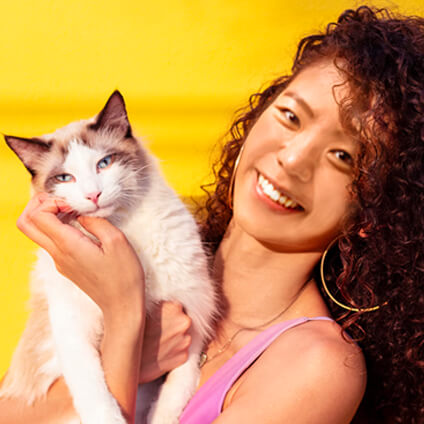
With over five years of specialized experience as an animal writer, my expertise lies in cat nutrition, health, behavior, grooming, and training. I am dedicated to delivering helpful and informative content that caters to the well-being of our feline friends. My primary goal is to empower pet owners with knowledge and ensure our feline companions thrive in health and happiness. In my free time, I love volunteering at local cat rescue centers.
